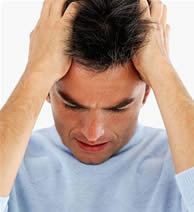 “It starts spinning in my brain and then it’s pounding in my chest.” – Jeffrey Lewis
“It starts spinning in my brain and then it’s pounding in my chest.” – Jeffrey Lewis
Check out this 3 minute video by Jeffrey Lewis on You Tube:
[youtube]http://www.youtube.com/watch?v=lKYDcAsahXY[/youtube]
What is anxiety?
Anxiety is an addiction to negative thinking about the past or future that creates a physiological fight or flight response in the body. Fear and panic create a debilitating condition that prevents people from taking risks, pursing their dreams, or sometimes, even leaving the house. The Diagnostic and Statistical Manual of Mental Disorders IV (DSM) describes anxiety in this way:
“Anxiety disorders are the most common form of mental disturbance in the United States population. It is estimated that 28 million people suffer from an anxiety disorder every year. These disorders are a serious problem for the entire society because of their interference with patients’ work, schooling, and family life. They also contribute to the high rates of alcohol and substance abuse in the United States. Anxiety disorders are an additional problem for health professionals because the physical symptoms of anxiety frequently bring people to primary care doctors or emergency rooms.”
What are the symptoms of anxiety?
• Shortness of breath
• Chest pain
• Rapid heart rate
• Sweating
• Headaches
• Difficulty sleeping
• Excessive ongoing worry
• Irritability
• Difficulty concentrating
How are anxiety and low-self esteem connected?
The experience of anxiety can range from uncomfortable to completely terrifying, depending on the situation. When you feel anxious, it is difficult to put your best foot forward and feel confident about what you are doing or saying. Furthermore, the fear of experiencing anxiety often keeps people from doing what they want to do for fear that they will experience an anxiety attack.
How can I feel less anxious?
• Set aside time each day to consciously relax and concentrate on your breathing. You may want to start with 5 minutes and increase the time as you recognize the benefits.
• Create a routine before bed if you have trouble sleeping. Listen to some relaxing music, take a hot bath, and/or drink some Sleepytime tea. Try to avoid activities that activate the mind such as working on your computer before bed.
• Limit your caffeine in-take. Since caffeine is a stimulant, it adds fuel to the fire of anxiety.
• Get regular exercise. Exercising is a good way of moving and shifting anxious energy, as well as tiring out the body so it is easier to sleep.
• When you do feel anxiety, see if you can observe it. What are your thoughts? Feelings? Sensations in your body? Take a minute to experience your anxiety without judging it.
• Ask for support from someone you trust. Sometimes sharing our experience instead of hiding it can be helpful.
What if I can’t motivate myself to try anything?
Because the experience of anxiety can be so powerful, many people feel helpless and afraid that their lives are out of control. These feelings can be an obstacle to trying something new. Start small. Pick one of the above ideas that feels the least daunting and try it. Think of it as a way to empower yourself to do something about your anxiety. Notice if it makes an impact on your level of anxiety.
The anxiety video on You Tube:
The young man in the video, Jeffrey Lewis, gives us an inside look at the negative thoughts in his mind that are creating the physical symptoms of anxiety. Training yourself to recognize when you are lost in negative thought, and bringing your attention to something that is happening in the present moment, such as your breathing, will help you stop the anxious thinking and reduce the physical symptoms of anxiety.
For more information on how you can feel less anxious, please visit the anxiety page on my website at: www.cultivateconfidence.com

